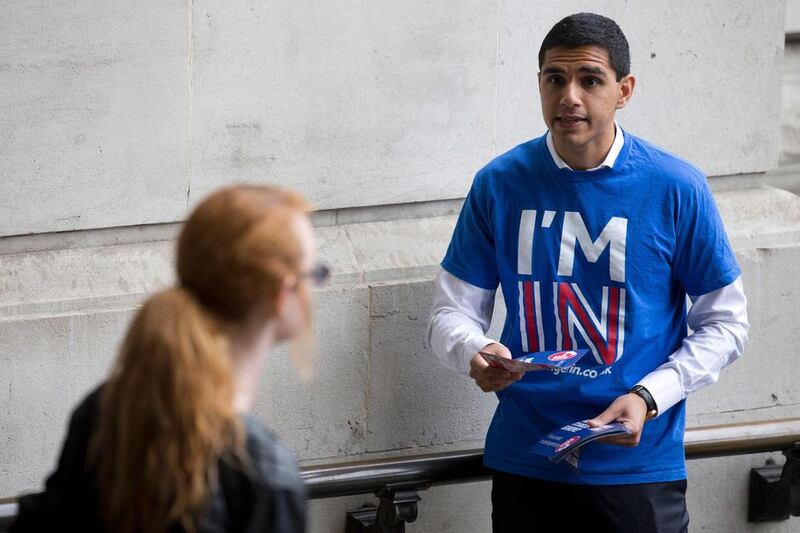By Friday it will all be over – the campaign for a referendum on the UK’s membership of the European Union which must go down as the dirtiest, most deceitful and debased political campaign in living memory.
Little has been to the credit of any of the key participants. Lies and exaggerations have been put about by both sides. The prominent “Leave” leaders Boris Johnson and Michael Gove are not “Little Englanders”. Both are highly intelligent men with broad interests and minds.
They will both know that Turkey has been trying to join the EU since 1987, and at the present rate of progress it may well be another 30 years or more before it gets any closer to membership. They also know that if Turkey were in the EU, the chance of its total population of 77 million all deciding to move to Britain is zilch.
Yet both have warned that this is where the EU is headed, and that the UK must leave for fear of Turks swamping Blighty in some neo-Ottoman nightmare of which not even Recep Tayyip Erdogan would dream.
Both men also know that it is totally incorrect to say that Britain sends “the EU £350m a week” as it says on the side of the Leave campaign’s battle bus. They know that after the rebate negotiated by Mrs Thatcher, the UK sends £100 million less and they probably also know that taking into account EU grants to Britain, the net contribution per week is around £164 million. That’s still a lot. Yet both continue to defend the larger, completely false figure.
The Remain camp, meanwhile, has indulged in madly over the top scaremongering about the economic consequences of exit. They have successfully roped in everyone from prominent Europhiles to figures who have no business commenting on an internal political matter – such as Barack Obama and Mark Carney, the supposedly independent governor of the Bank of England – to warn of a plummeting pound and a friendless future.
In fact, the economic case cannot be proved conclusively either way, and Leave’s Lord Lawson – a highly praised chancellor in the 1980s when he was seen as one of the more pro-EU Tories – makes a very good point when he says: “Look at unemployment rates around the EU, particularly very high youth unemployment rates. The idea that somehow it’s an economic asset to us to be in the EU is bizarre.”
The concentration on immigration has been particularly ugly, it appearing to be now near-universally accepted that this is an unwelcome imposition and the argument is only over how best to restrict it. And the referendum was promised by David Cameron for the wrong reasons in the first place – as a means to paper over cracks in the Conservatives, the prime minister assuming, rather over-optimistically, that he’d be able to wing an easy victory.
Nevertheless: it has still been right and necessary to have this referendum. The last time the people of Britain had a say about their relationship with the EU was in 1975. Some Europhiles used to argue that that settled the issue once and for all. No one has dared repeat that self-satisfied assumption, thankfully, as it arrogantly ignored the views of all who were too young to vote then and those yet to be born.
Moreover, the then European Economic Community was a completely different creature; both far smaller, and with smaller ambitions. It then morphed into the European Community, and then the European Union. The unelected Commission, meanwhile, which consists largely of superannuated or failed ex-politicians, managed to change itself from being the bureaucracy of the community, into being its “executive body”, as it declares on its website. All without any consultation with, let alone the consent of, the voters.
Democratic accountability and sovereignty – the people of Britain having a proper say about their own governance – is what the whole debate should have been about. In terms of the EU itself, the debate is pretty much settled. Both the proponents of “Remain” and “Brexit” agree that the union is in desperate need of reform and of addressing its perennial democratic deficit.
The question is whether the EU is capable of doing so. And it has become clear – because whenever there is a crisis the old elites who have always run the EU keep saying the answer is more Europe and closer union, despite all the evidence to the contrary – that it is not.
For that reason alone it has been right for Britons finally to be asked if they want to continue inside the EU or not.
For what it is worth, were I registered to vote, I would vote leave. Many will disagree, and they may turn out to be the majority. But for all the odious sound, fury and invective the referendum has generated, for all that it was held cynically and has magnified prejudices that do Britain no favours, it was still just that it was held.
The alternative is to say that the people should simply have no say in the matter, and that the vote of our forefathers binds us in perpetuity. That is what the Euro-elites, terrified that their would-be superstate may be about to unravel, believe. That is why the EU is incapable of reform. And that is why so many people, infuriated by being ignored by unelected officials too superior and too insulated to care about the voters for decades, will vote out.
Sholto Byrnes is a senior fellow at the Institute of Strategic and International Studies, Malaysia





